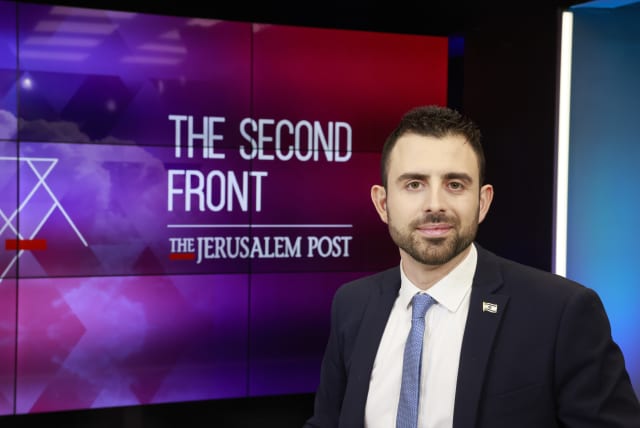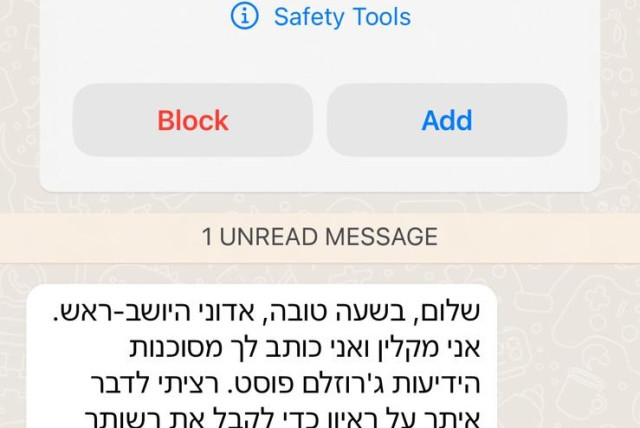Fake 'Jerusalem Post' journalist tried to interview former PMO spokesman Eylon Levy

Iran and its proxies have launched a number of cyber attacks against the Jerusalem Post, and attempted to publish fake news articles, with false data, against Israel.
Former Prime Minister Office (PMO) spokesman Eylon Levy was approached by a person claiming to be a reporter for The Jerusalem Post. After understanding from the Post that the man who approached him via WhatsApp isn't affiliated with the newspaper, he blocked him and ignored the approaches.
A man using a British cellular phone number, texted Levy while he was still a spokesperson for the PMO mid-December. According to WhatsApp , his "name" was or is Isaac McLean.
The message read in Hebrew: "Hello Mr. Chairman, I am Mclean, and I am writing to you from the Jerusalem Post News Agency. I wanted to talk to you about an interview to get your permission to speak."
Levy approached the Post and understood that this wasn't a real pitch for an interview. One thing that caused him to be hesitant was the fact that the Hebrew in the message was translated very poorly.
Levy acknowledged the details mentioned this article on Saturday night. The Post has been suffering from enormous amounts of cyber attacks since the October 7 war broke out - many of which from what is understood to be Iranian groups and proxies. In addition, a number of attempts were made to create fake news articles, with false data, against Israel, in screenshots that look as if they were taken from Jpost.com.
Unfortunately, this has become a popular way for Israeli enemies to try and reach Israeli leaders or their supporters.
Fake Jerusalem Post staff
Last week, we reported that Pouria Zeraati, a prominent dissident Iranian TV presenter who recently survived a stabbing attack outside his home, revealed a deceitful attempt to compromise his security through a bogus interview request - according to a report by The Jewish Chronicle (JC). The attacker, posing ask a journalist from The Jerusalem Post, aimed to lure Zeraati into a trap, highlighting the lengths to which adversaries will go to target vocal critics of the Iranian regime.
A key figure on the anti-regime channel Iran International, Zeraati recounted his harrowing experience and the subsequent psychological battle he faced in the aftermath of the assault. “Physically I’m feeling better,” the dissident shared with the Chronicle, but “mentally, it’s totally different. It’s going take a long time to get over it.”
According to the Chronicle, the conversation took a significant turn when discussing the need for the UK to designate the Islamic Revolutionary Guard Corps as a terrorist organization, a standpoint Zeraati fervently supports. In an interview with Israeli Prime Minister Benjamin Netanyahu last year, Netanyahu echoed the sentiment, underscoring the IRGC’s global threat and offering intelligence to justify such a move by the British government.
Iran International tweeted on Thursday that its “presenter Pouria Zeraati who recently survived a knife attack outside his London house, told The Jewish Chronicle he “received a message from someone using a phone with an Israeli +972 code, purporting to be a journalist from The Jerusalem Post who wanted to interview him.
Jerusalem Post Store
`; document.getElementById("linkPremium").innerHTML = cont; var divWithLink = document.getElementById("premium-link"); if (divWithLink !== null && divWithLink !== 'undefined') { divWithLink.style.border = "solid 1px #cb0f3e"; divWithLink.style.textAlign = "center"; divWithLink.style.marginBottom = "15px"; divWithLink.style.marginTop = "15px"; divWithLink.style.width = "100%"; divWithLink.style.backgroundColor = "#122952"; divWithLink.style.color = "#ffffff"; divWithLink.style.lineHeight = "1.5"; } } (function (v, i) { });

